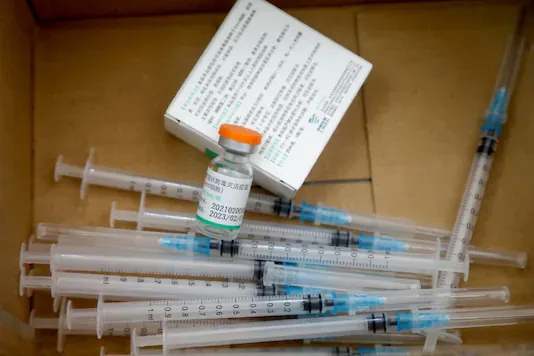Single-use Plastic Bioreactor Bags to Filters: Why India Needs Them From The US for COVID Vaccines

Image for representation
These raw materials for vaccines are produced in a limited number of countries, around 27, and by a limited number of manufacturers, around 270.
- Last Updated:April 27, 2021, 10:22 IST
- FOLLOW US ON:
After facing flak for blocking the supply of raw materials needed for COVID-19 vaccines being manufactured in India, the United States on Sunday said it would rush the materials needed by Indian vaccine manufacturers. The decision was reached following a series of conversations, most recently between India’s National Security Adviser Ajit Doval and US counterpart Jake Sullivan regarding the worrying rise of COVID-19 cases in the country.
One of the primary reasons India has been pressing the United States for the raw materials for the vaccines is because the US—although not the only manufacturer of the raw materials—is the largest manufacturer of the specific vaccine items that Indian companies have either in limited stocks or they needed in additional quantity to ramp up the production.
Also, Indian vaccine manufacturing companies stand in a precarious position. One, the other approved manufacturers of raw materials may not have enough quantity to meet the demand. Second, buying from new manufactures and other countries may require additional regulatory approvals, which have their own challenges and delays. Each of the required items during the manufacturing process has been pre-approved, which means that the manufacturer who supplied the raw materials and the specifications of those materials have already been finalized and will remain the same throughout the process. So, suppose a company decides to take a different route and buy few raw materials from elsewhere, in that case, that company will obviously have to go through the process of approval again, which is tedious and time-consuming and can affect the vaccine availability and slow down the vaccination drive in India.
According to the World Trade Organization assessment, around 9,000 items are needed in the vaccine manufacturing industry. Some of those items are required for particular vaccines and not all of them. These items are produced in a limited number of countries, around 27, and by a limited number of manufacturers, around 270—namely, some European countries, the US, and India—so, despite regulatory challenges, India is not entirely dependent on the US for these raw materials. However, the US is the largest manufacturer of some of the items, and India has large requirements to scale up massively; therefore, India’s dependency on the US for these raw materials is greater.
One of the items for which there is reportedly a requirement in India is the single-use plastic bioreactor bag. Vaccine manufacturing requires big units where static stainless steel bioreactors are used to grow cells and materials for vaccine development. From these cultures and materials, vaccines are made. However, these bioreactors are fixed units and take time to set up. In COVID-19 vaccine production, India doesn’t have that kind of luxury to set up factories and install such large fixed bioreactors because it wants to scale up production rapidly.
So, the alternative to stainless steel bioreactors is single-use plastic bioreactor bags. With the use of these kinds of bags, cells can be grown as well as mixing of ingredients can be done and the large process of manufacturing vaccines can be carried out easily, depending on the availability of these bags. So, instead of static units, the Indian manufacturers are turning to single-use plastic bioreactor bags to scale up production.
The other raw materials that are required are standardized filters, which manage purification and sterilization requirements. I believe some cell culture media and some nanoparticles to package vaccines are also required.
However, what we need to understand is that the need to procure raw materials from the US may not entirely be due to shortage, but to scale up future production as well, to avert any scarcity in the future.
There is a third dimension to exporting raw materials from the United States that needs to be addressed. There is a law that the US government has invoked, that it does not matter if a company is Swedish or German, but if its manufacturing plant is located in the US, then the American rule will be applicable, and they cannot export.
There is a lot of demand for vaccine raw material items in the US as well. Their vaccine manufacturing plants are working 24×7, and they also might need the same raw materials that we want. Their law allows the US companies not to fulfill their existing commitment unless they fulfill domestic requirements first. However, despite that, the fact that the US has agreed to lift the embargo is a positive sign.
But, it has to be understood that even though the US government has said that they would start supplying the raw materials, it doesn’t mean they would make these items available in India from tomorrow. It will also take some time; in the meanwhile, the Indian manufacturers are holding the fort with what they have.
As told to Simantini DeyRead all the Latest News and Breaking News here

